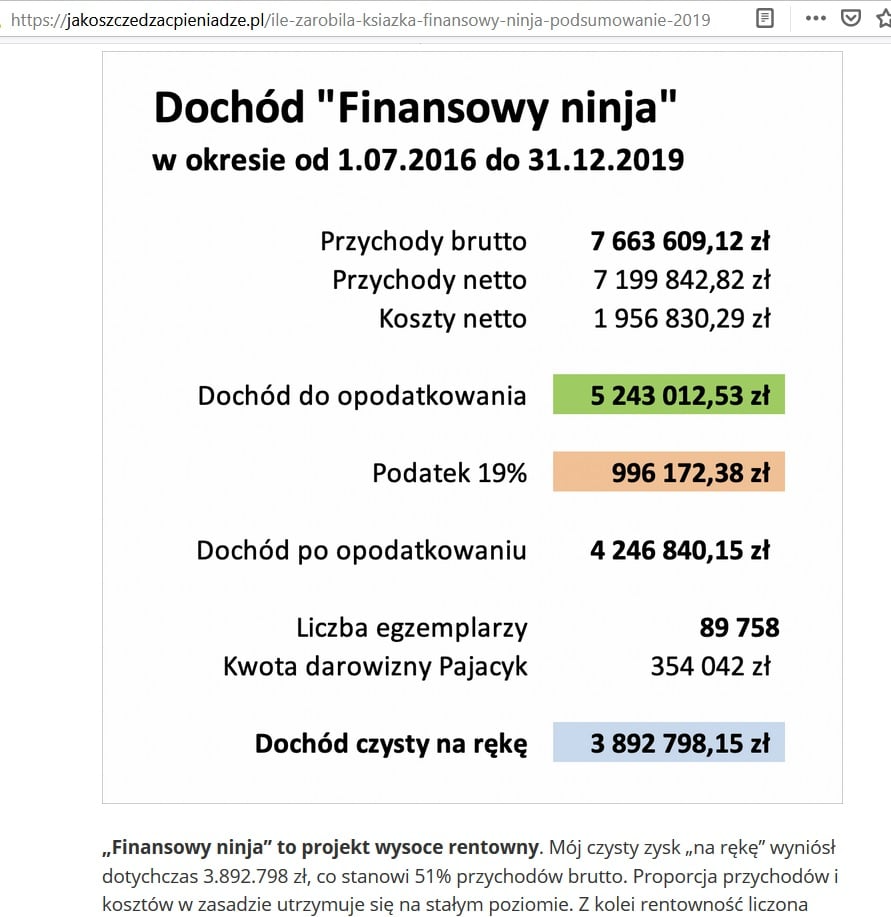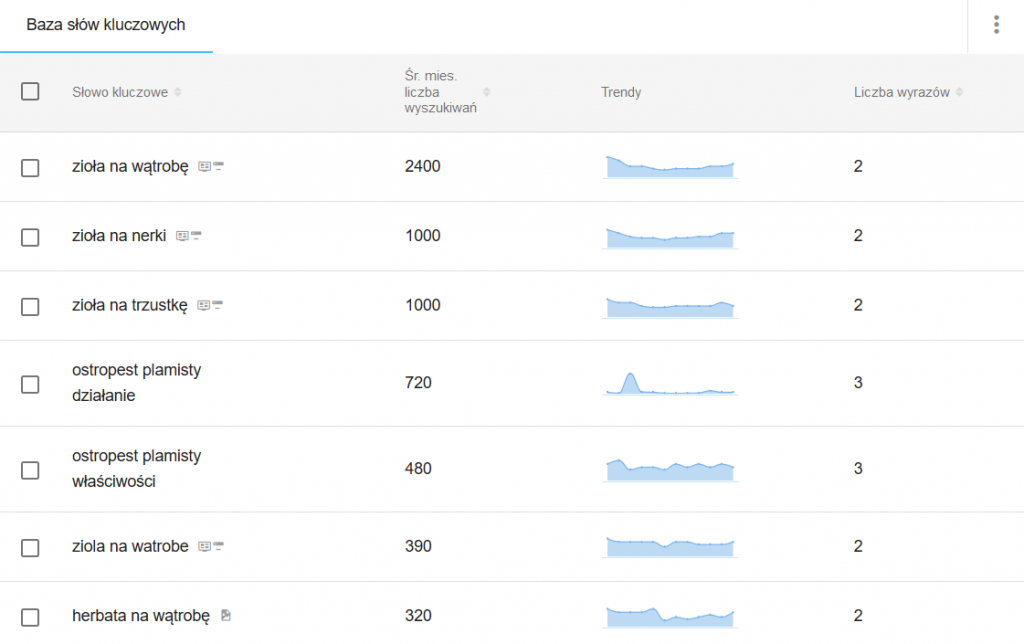“Learn how to grow your blog to 100,000 visitors a month and turn thousands of your readers into paying customers!”. I didn’t come up with this myself. It’s the slogan of one of the English-language courses on how to make money from a blog. It’s pretty good and captures the essence of the thing. It’s probably what you want. Will you get it after reading this article? A lot depends on you.You’ll find a solid foundation and a look at the topic from many different but equally important angles. If you implement this knowledge, you will be fine. Here we go.
To start, we’ll look at the mindset of the blogger. The beliefs he has about blogging and earning. The approach to the whole game.
The blogger’s mindset, or how to think about earning from a blog
.
I contacted some of Poland’s top bloggers to ask them how to actually think about this whole blogging monetization thing. I got two answers: from Jakub Roskosz and Kamil Nowak. The common denominator? Don’t focus too much on cash..
Jakub Roskosz on making money from a blog
.

“First of all, it is worth thinking about blogging in the first place. Blogs run only out of motivation to make money usually do not make money at all. Earning money from a blog is a side effect of working at a high level and usually writing about your passion and interests for many years..
Why?”.
People who set up blogs solely for financial motives quickly lose their enthusiasm and motivation, because even for the first few months and years such activity generates only costs without much profit or only with occasional income. A blogger must be credible and what he describes and presents consistent with his beliefs and perception of reality. Years of work also increase the chance of greater reach, and these are as crucial in obtaining contracts as credibility..
It is also worth observing the best bloggers in the industry. You can quickly come to the conclusion that most of them are very selective in choosing the advertising campaigns they participate in. They are very careful to make sure that even commercial content is consistent with the theme of the blog. When we blog only for. the financial aspect of selectivity is rather difficult to talk about, the blogger becomes an advertising pillar and loses credibility both in the eyes of the audience and advertisers” – Jakub Roskosz, one of the most popular and influential lifestyle bloggers in Poland.
.
Kamil Nowak on making money from a blog
.
Kamil Nowak of the wildly popular and highly regarded Father Blog responded in a similar vein. If you’re looking for parenting advice, you’ll probably end up on his site sooner or later.

“I think that paradoxically the most important thing that helps you make money from your blog is an approach to your blog completely unrelated to finance..
I think the most important question we should ask ourselves related to blogging is, if it was impossible to make money from it, would we continue to do it? If the answer is no, then let’s not get into it. I say this not only from my own convictions, but also from experience – I know and have known dozens of bloggers, and always where the motivation was money and not passion, very quickly the enthusiasm disappeared, and there were claims, expectations and everything took a hit..
Giving content to others, providing value and trying to do it to the best of your ability, while having no expectations at all, is an incredible strength. That’s when the real magic happens..
What can further help is not tying your finances directly to your blog finances. The more our financial situation is independent of the blog, the easier it will be to say no when cooperation offers come up, which may not necessarily be good offers (but may be very well paid, for example). Readers don’t have a problem with bloggers cooperating with companies – they have a problem with some bloggers doing things for money that they themselves don’t quite believe in..
In my opinion, it is these two things – doing what we believe in and not having expectations – that are the qualities that can help us ultimately become a brand that people will want to identify with and want to work with (whether B2B or B2C). This of course takes time, but I’ve seen people taking shortcuts and it doesn’t end well” – Kamil Nowak, creator of Blog Father.
.
Sound good? Then let’s talk about specifics.
How to make money from a blog
.
Bloggers who manage to make money from their blog and live on it at a very decent level use one of these few simple tricks. Traditional entrepreneurs hate them….
Good. There are no magic tricks, spells or “one simple way to”. Making money from a blog is an example of doing business. And in business, as in business – there are different ways to make money, but they all have a common denominator: to make it work, you have to put in the work.
Given this fact, a reasonable question to ask yourself would be what kind of work do I want to do as a blogger?.
And the resulting follow-up questions:
- What makes me tick? (after all, it’s all about doing something you enjoy)
- What value do I want to provide? (what will I give of myself so that others will want to pay for it)
- What could I be – or already am – good at doing, and what will give me satisfaction? (a fish doesn’t need to learn to walk on trees at all to be successful, and a monkey doesn’t need to learn to dive)
- What needs can I help satisfy for people? (People have a need for good stories – I give them stories; a need for health – I give information on supplements and my own store; a need for increased self-confidence – I give an online course)
- What needs have I learned to meet? What problem have I been able to deal with? (this will help determine the above)
.
.
.
.
.
These questions are the more “soft”, psychological aspect. Universal entrepreneurial thinking, which is designed to help you find that sweet spot between an activity full of desire and one that brings in concrete money. It can apply as much to blogging as to any other business.
“Hard” aspect, on the other hand, let’s call choosing a specific form of earning..
Here we will distinguish four main ones.
Collaboration with brands
.
To get a better idea of this topic, it’s a good idea to simply read the offers posted on blogs. Most influential bloggers have a tab on their sites like “Collaboration” – and there they specify what they can do, and to what extent, for a fee (or for free, if it’s, for example, supporting charitable foundations or participating in some good cause).
This would be, for example:.
- Becoming a brand ambassador,
- Wide copywriting – preparing an article, course content, ebook,
- Becoming a patron of some action,
- Testing the partner’s products and services (and, for example, writing a review),
- Presenting at a conference as a speaker, conducting a training course or workshop,
- Giving business consultations,
.
.
.
.
.
.
If your thematic blog generates enough traffic (e.g. 50 or 100 thousand impressions per month), if you are visible enough on the web – it is likely that someone will reach out to you, using words such as “cooperation” and “money”.
The ReachABlogger platform, which connects bloggers with advertisers, can help.
Promote your products or services
.
Cosmetics: soaps, shampoos, hydrolats, oils. Clothes: shirts, pajamas, dresses, accessories. Gadgets: key chains, mugs, T-shirts, diaries. Books: guidebooks, popular science, short stories, cookbooks. Courses online: time management, getting to know women, dealing with emotions, making money blogging.
Bloggers sell a variety of things. Some offer only one-two products, others have a whole store hooked up to the blog.
The products and services offered will mostly correlate with the blogger’s position as an expert. For two years you have been providing material on herbal medicine. You already have your readers, fans, potential customers. Now there is space to finally write that e-book about replacing drugstore drugs with herbs and start selling it through your site.
Offering advertising space
.
The most popular is the Adsense system. This is Google’s advertising service that allows (mostly theme-specific) ads to show up on your site. It’s hard to talk about earning coconuts with this method, nevertheless it’s very simple to implement. It’s said to be a good one to start with – to get a feel for how blogging can actually bring in some money, rather than just requiring ongoing investment.
Earning from referrals
.
That is, so-called affiliate marketing. You review a new super beard shaver, and underneath is an affiliate link to the site of the store that offers the shaver. If someone buys after clicking on “your” link, you get paid. Simply put: you recommend someone else’s products, in a variety of ways, and through special links you direct to the seller..
The excellent marketer Craig Campbell talked about affiliate marketing during a Senuto webinar. And he argued that there can be really good money in this method. Worth watching:
To make money in any of the above ways, bloggers widely use the following:
.
(all or selectively)
> They become trustworthy experts
.
An expert means someone who knows his subject and whom people trust. So much so that they can sometimes make crucial, life-altering decisions based on his or her opinion. From an expert one is more willing to buy – that much is clear.
> They give people something that really helps them
.
> They drink at least 2 liters of water a day
.
Ok, maybe not all bloggers do that. Either way, you need to drink plenty of water to keep your brain working well.

> Turn visitors into subscribers
.
> Increase traffic from search engines using tools designed for this purpose.
.
Wypróbuj Senuto Suite przez 14 dni za darmo
Zacznij 14-dniowy trial za darmoThis is insanely important and we will focus on it later in the article.
But now it’s time for the question everyone has been waiting for.
How much money is earned from a blog?
.
And this is a very good question. To which there is no good answer. And in any case – a precise one. Because the answer “sky’s the limit” is not particularly specific. But it also seems to be the closest to the truth.
Running a blog can bring an audience.
Audiences can be turned into customers by offering them a product.
The number of potential customers and the quality of the offered product and its price will translate into earnings.
Gather more potential customers, offer a better product and adjust the price better, and you will earn more. This is not a truth of the blogging world, but of business in general. It’s as old as the world.
“You’ll earn more,” or how much, for example?
.
Michal Szafranski, author of the blog How to Save Money, wrote about himself back in 2015 that he’s actually just starting out, he’s growing, that he’s increasing his rates and income year by year, but that’s how he’s taking it easy, so he doesn’t feel like such a complete expert on making money from a blog yet.
It wasn’t long before he dropped quite a bombshell: “Listen, I’ve made my first million from my book.”.
The initial print run of “Financial Ninja” went down in flames. A reprint had to be made quickly. Then another and another. Before we knew it, Michal Szafranski was sitting behind the wheel of a Tesla worth several hundred thousand zlotys, which he bought thanks to the book’s sensational sales results. Today (April 2020) sales are hitting 100,000 copies, and the overall financial result from the release in 2016 to the end of 2019 is 3.89 million zlotys of pure profit.
Michal Szafranski became several million zlotys richer through the sale of his book. But this was only possible thanks to the fact that he had previously been diligently developing his blog (on which, by the way, he also earns crores) for several years. If he hadn’t had a fan base built up, for whom he appears as an expert in the field of finance, he could have even sunk a few(a dozen) thousand zlotys by publishing the book himself. As we know, the story turned out differently.

So much for the book. And the blog itself? At the beginning of 2019. Michael boasted that in six years he recorded about PLN 6 million in revenue from it..
Not many people manage to be so successful. The author of the How to Save Money blog is an example from the blogging league. An example to open your mind to the fact that while blogging can be an activity that gives you a few hundred, a thousand or a few thousand zlotys a month – it can also be something that will put a brand-new Tesla in your garage and increase the number of zeros in your account to six.
Earnings of bloggers
.
Extra-class is extra-class, but what about when it comes to, say, average earnings? Is it possible to make a living from blogging?
The earnings of Polish bloggers is not the most well-researched topic. Whitepress, for example, conducted a survey among bloggers that looked, among other things, at their earnings. Except that this was in 2015, a good 20 years ago. The results may be completely out of step with today’s realities, and so let’s take them loosely.
- 23.5 percent of the bloggers surveyed earned between PLN 100 and PLN 500 at the time
- 21.3 percent between PLN 1,000 and PLN 9,999.
- 21.3 percent earned between PLN 1,000 and PLN 9,999.
- 19.1 percent between PLN 500 and PLN 1,000.
- More than PLN 10,000 was earned by 5.5 percent of respondents.
.
.
.
Earnings vs. number of page views
.
More recent data comes from the end of 2017 and the report “Earnings of bloggers 2017” by BLOGmedia.
It shows that in 2017, bloggers earned an average of about 22.5 thousand zlotys, while the average rate for a post was 1853 zlotys, and for a social media post – 739 zlotys.
What necessarily needs to be emphasized, although there is nothing revealing about this, is that rates increase proportionally to the size of the blog. A blogger who records between 10 and 20 thousand page views per month, on average, receives PLN 913 per post. With the number of page views at 150-500 thousand, the rates per entry can be as low as between 3,500 and 4,500 zlotys.
A full-time blogger? It’s possible
.
Although it must be said honestly that it is not somehow wildly likely.
According to a 2017 study, only 4 percent of bloggers did not work professionally, making a living from their blog alone. In order to earn an income of about 8,000 a month, you needed to generate about 150,000 page views.
Much also depends on the subject matter. Statistically, the best earnings are given by blogs related to parenting, and the smallest – those devoted to the subject of beauty care.
To sum up the issue of earnings: if you want to make money from a blog, the question of how much you will earn depends on various factors. Starting with your talent and charisma, ending with the “hard” ability to generate traffic to the site.
The first can be a matter of a combination of genes and personal training. The second is simply concrete knowledge and action..
Let’s look at the knowledge and action aspect.
How to increase blog traffic?
.
The more a blogger professionalizes, the more his actions are thoughtful and purposeful. Strategy and the tools used begin to play a role. A hobby blogger, but with a Google Analytics and a monthly content publishing plan, is already a few steps closer to becoming a blogger-businessman.
That is, one who enters his bank account and sees real income from blogging.
We established earlier that the number of visitors to a site matters. If a blog generates more traffic, advertisers will pay more for space, and brands are more likely to cooperate. More traffic also means more potential customers, ready to buy your product or service.
There are basically two main sources of traffic to your site:
- Social media
.
.
Let’s start with “sociali”.
Social media vs. blogging
.
Social media channels such as Facebook, Instagram, Twitter and LinkedIn can actually bring traffic to a site. They are an important part of blogging that should not be overlooked.
A blog’s social media profile is first and foremost an opportunity to gather fans in one place who can be reached at any time. Make contact with them, initiate a discussion. Toss them a link to fresh blog material, which at least some of them are eager to click on.
It’s worth keeping in mind all the time that on social networks are your potential customers. By acquiring a fan, you have actually acquired a so-called “lead.” Someone who has expressed an initial interest in your brand, and at some point you will be able to target them with a specific sales offer.
When it comes to the sensibility of using social media channels, there is also the issue of prestige. People look at the numbers .
If your fanpage has 10,000 likes, someone might think, “OK, there’s some popularity, which means it might not be bad, I’ll look into it.” Boom, suddenly became a reader. Whereas when those likes are 100 or 300, it may not mean that the visitor will definitely swipe and leave. But it may be harder to gain his trust at the start.
This is how social proof of legitimacy, one of the cognitive patterns of humans, works. “If so many people gave a thumbs up, they’re probably right.” Often misleading – yes. However, one should keep in mind that it works.
A fan base is also something your potential advertisers often don’t have. They’ve created a product or service, but haven’t built a community around them that trusts them. They may also be just as anxious to reach new potential customers. By having people around you that you influence through your content, you become an influencer (or a micro-influencer, if the community is relatively smaller than the biggest blogging stars). By being an influencer, you can more effectively recommend other brands or specific products. And brands can and want to pay for this.
In summary, taking care of social media gives you:
- Base of fans, i.e. people who, one, add to your website traffic (you give them links they click on), and two – who are your potential customers. By having an ongoing relationship with your brand, they build trust in you and may someday buy something from you.
- Prestige. More fans, more likes, more comments, it’s social proof that can convince new people to follow you as a blogger. Or to buy something from you, even at the very first contact with the product.
- The opportunity to become a (micro)influencer. Brands want to work with bloggers who have a community built around them – that is, “real people,” not just dry statistics in Google Analytics (even if impressive).
.
.
.
In that case, to increase the size of a blog, is it enough to maintain social media profiles?.
In theory, you could be a blogger who has built an incredibly developed and loyal community of fans on Facebook or Instagram, for example. From there, he began to successfully direct people to the site without particularly caring about traffic from the search engine.
You have gathered this community around some catchy idea or niche topic in which there aren’t many experts.In the community, you are known as TEN bloggers. Your nickname comes up in behind-the-scenes conversations. At receptions. At industry meetings and conferences. As someone’s last word on their deathbed. Everyone knows who you are about. No need to google you.
In addition, you don’t need a lot of website traffic. All you need is for those who enter to enter. Thanks to the power of your personal brand, they will buy enough of your products and book your services for the next quarter anyway.
Yes, this is all a rather unlikely scenario.
More likely, what you most need as a blogger with aspirations to make money in the first place is more traffic to your site.
alone.
There is a goal that social media is not the best means to achieve. That goal is to give your blog a steady increase in visitors.
A simplified scheme for bringing traffic to the site from Facebook or other social media is as follows:
You publish a new article, notify your fans about it, fans click on the link, read the article, the article is cool, they give a thumbs up.
You look into Google Analytics and actuallyyou see an increase in visit statistics. Out of 10,000 fans, 2,000 clicked on the link to your fresh article.
Or let it be that you created a so-called viral. Material that, thanks to the support of other influencers, quickly gained a lot of popularity on the Internet, reaching widely beyond your original fan base.
So you get 10,000 clicks.
On the Google Analytics graph, it looks as if your heart rate is restored in an instant. The hitherto flat line suddenly shoots upward. In one, two, three days it reaches its peak, then…. piques down to the old level, possibly stopping slightly above it.

The pulse has faded again. It will only be restored by the next article you publish in a few days. On the graph of visits, the period between publications will be marked by a flat line with a low value.
In practice, this means that the traffic on your site, if you rely on social media, is dependent on new publications. The site will record “shots” of visits at times when you upload something and inform your fans about it.
“Addicted” is a good word. After all, if you cut off the flow of new material, the blog will quickly turn out to be dead.
Social media vs. SEO
.
Running a fanpage, increasing the number of fans, engaging them in discussion, etc., is a whole, separate philosophy. This topic is worth exploring in depth, and give your social profiles due attention. After all, concrete benefits flow from it.
At the same time, if you care first and foremost about increasing traffic to your site, social media should be secondary to taking care of so-called organic traffic – that is, traffic gained through the search engine.
Do not underestimate this issue when thinking about how to monetize your blog. If you want to make money from your blog, you must learn to “get into the whole SEO thing”, that is, apply actions that enhance your site’s position on the Internet (SEO is an acronym for search engine optimization, search engine optimization). There’s no substitute.
Optimizing your content and the site itself for Google can get you a lot of traffic from the search engine – and a steady increase in the number of visitors, independent of “shots” from social media.
This is an important part of the efforts of virtually all bloggers, who have enough visitors to the site to earn concrete money.
Increase site visibility and the magic of keywords
.
To note more traffic to your site, you mustincrease its visibility in Google for related blog topic keyword phrases..
This brings us back to a quite plausible hypothesis from a few paragraphs above: a blogger who makes money has a strategy. A publication schedule. He schedules posts not only for their timing, but also for their content.
How does a money-making blogger know what he should publish?
Obviously, his own thoughts, emotions, inspiration, intuition – all these play a considerable role here, determining the style and content of the publication.
But no less important role is played by keywords (or phrases). Because in order to note more traffic to your site, you need to increase your visibility in Google for these keyword phrases related to the topic of your blog.
What are keyword phrases?
.
It is through them and through them that the blogger determines who his material should reach. Whether it ultimately hits – this will depend on a number of factors, including the strength of his competitors, who, after all, are also vying for the highest possible positions in Google.
The mechanism is simple. You type into Google the query “how to dress for New Year’s Eve” (that’s the key phrase) and that’s how you get to Jakub Roskosz’s blog. He made sure to beone of the first suggestions for solving the problem you typed into the search engine. By the way, since you’re already here…. why don’t you take up the offer of cooperation?

Key phrases show what people are actually searching for on Google. And as a blogger, you want and need to know this. To be able to shape future trends, you need to stay on top of current ones all the time.
For a more in-depth knowledge of keyword phrases, check out this article: Keyword Search – a step-by-step guide.
Fight for position
.
With smart SEO efforts, it is possible to get on the first page or even the first positions of the first page of a search engine – for keywords that interest your potential readers and customers.
“What to see in London” or “where to eat in Zakopane” can direct to your travel blog.
“Makeup tricks” to a fashion blog.
“Baby beats head” to a parenting blog.
“How to save money” will lead to Michal Szafranski anyway, but maybe you’ll fight for second place.
The answer to the question of what phrases should drive people to your blog (or, in other words, what on the Internet your potential readers might be looking for) will largely determine your publishing strategy.
Earning from a business blog
.
At this point it’s worth mentioning the topic ofcompany blog, which by itself would probably require another big article. Let’s agree that we’re not going to go too deep, but rather glide across the surface.
A company blog is first and foremost:.
- Building a community around the brand,
- Building credibility,
- A possibility to establish cooperation with other companies (for example, on the basis of publishing guest posts),
- Gaining new customers, advertising products and making sales,
.
.
.
.
As you can see,it is somehow not very different from running a “regular” blog. The main difference can be defined in such a way that having a “regular” blog, the business aspect generally comes later; in the case of a corporate blog, you start by creating a business, and the blog arrives as a tool to help you sell.

It is often this aspect of sales support that content marketing (content marketing) specialists focus on in their work. A well-written article can lead the reader by the hand, from gaining their attention and interest in the topic (top of the sales funnel), to interest in the product, to clicking “add to cart” and “pay” (bottom of the sales funnel).
Sales funnel
.
The blog itself is mostly classified as a tool from the top of the funnel, and therefore primarily serves to stimulate brand awareness, to gain the attention of a potential customer. That is, in practice: someone searches Google for an answer to a question he has asked, such as “how to increase sales in an online store” and finds an article on this topic on the blog of a marketing company.This way he gets the answer he was looking for, and at the same time gets to know the company whose services he may use..
By accessing this article, he finds himself in a sales funnel. Perhaps he will leave it, or perhaps he will go all the way down – he will make a purchase. This depends largely on the author of the article. If he or she efficiently guides the reader through the entire “customer journey,” perhaps he or she will leave with the impression that the smartest thing to do now is to click “Buy” or at least send an inquiry.
To make this work,it’s a good idea to match key phrases to the reader’s intentions. These intentions change as the reader progresses through the stages of the “customer journey.” In a sense, we will use slightly different language at each of them. It is necessary, firstly, to have a good understanding of the idea of the sales funnel and customer journey, and secondly, to efficiently use a tool that will help us adjust key phrases. You will also increase the chances of sales success by using benefit language.
How to find keywords for your blog.
Here Senuto, which, by the way, is used by many Polish bloggers, proves to be of great use. In the application you can easily find answers to key questions, from a strategic point of view.
Key questions and key phrases. This is what interests us.
This will help you see how specific SEO activities translate into an increase in your site’s visibility in Google. You watch the progress. The smile grows.
Well, unless you’re making some mistake in your SEO efforts, that’s why the visibility doesn’t grow and the smile doesn’t grow either. In that casespend some more time onSenuto’s blog, where you’ll find plenty of good solutions and SEO tips.
>What is my position on the chosen phrase? (and how to get stronger on the phrase).
Checking this is especially useful if you want to quickly see what the position of a selected site (not necessarily your own) is for a specific keyword. If you have a blog about professional development, you may want to be visible for the phrase “self-presentation” (Senuto’s keyword database shows that this keyword is searched 4400 times per month).
If your position for this phrase isn’t catching on the first page of searches,it’s worth boosting it – for example, by creating the best and most comprehensive article on self-presentation as the Internet long and wide. How to accomplish this?
This is where the aforementioned concept of Topical authority comes in extremely handy, which tells you how to create the kind of article-colossus that Google will love you for and lovingly send millions of readers to your site. Read about it.
The keyword database is invaluable for finding topics for posts, so you can create a very good content plan (the content you want to appear on your blog). This module also helps you find keywords for a specific article so that you can better write it “under Google” (if you write better “under Google”, Google likes you more and pushes you higher in search results). The phrases collected in the database can be customized as needed and saved in a convenient .xlsx file.
In the Keyword Base module, you will also check what specific questions your potential readers are asking on Google (Questions report). Without this knowledge, it’s hard to imagine a well-tailored publication plan geared toward increasing traffic from Google.
Another important thing is dependent words, that is, phrases semantically related to the one you are most interested in. What is semantically related to the word dog? For example, a leash or food. And with the phrase “how to make money from a blog”? For example, “how to make money from a blog”. With a list of such correlations, you know what dependent phrases to use in your article so that Google will find it most valuable in the context of the keyword phrase and push it higher in the search results.
How then to search for keywords for an article?
.
It’s easy.
Choose a phrase related to the topic you want to discuss in the blog or the product you want to sell. Let’s stick with the example of a blog dedicated to herbal medicine. You are interested in the phrase, for example, “herbs for liver”. When you type it into the Senuto Keyword Database, you’ll see a list of suggestions:

In addition to these results, you can also check the specific queries that are most frequently typed into Google in connection with the phrase, what are the related dependent words and groups of words. Based on this, you know what Google will treat as valuable material in the context of the query “herbs for liver.”
It is largely up to your creativity how you use key phrases in your article. Karolina Matyska of Senuto wrote a very cool guide how to write an article on the Keyword Database – check it out.
> How to see which phrases are popular in a given month?.
Seasonality of phrases in Google is another topic. “Garden furniture” is not particularly popular in December, while “New Year’s Eve ideas” is not one of the search engine’s August hits. Therefore, with the publication of certain materials it will be better to wait. With others – hurry up while the season lasts.
Knowing what Google trends will be in two or three months, you can prepare in advance. Think about the topics and this article on garden furniture quietly prepare yourself a few months before the start of the summer season and just refresh it at the right moment. In fact, in January, based on seasonality, you can plan publications for the whole year (not news, of course, but the so-called evergreen – that is, those that, as a rule, do not lose relevance).

> For what phrases are my competitors visible and I am not?.
An excerpt from the linked guide page basically says it all: “Curiosity is the first degree to hell. However, there is information that you simply must have. One of them is what phrases your competitors are visible for in Google, and your site is not. This is a very important point, because the traffic your competitors are gaining in this way could belong to you.”
That’s why it’s a good idea to generate a report from time to time, showing what the situation is regarding each phrase for your domain and your competitors’ domains.
Which means in practice:.
- You are looking for phrases on which your competitors are visible and you are not,
- If these phrases are relevant to your site, you prepare valuable content on them. Better than your competitors have, of course. Again, we return to the concept of topical authority.
.
.
SEO on the blog and a joke at the end
.
Let’s emphasize it again: your site’s SEO (search engine optimization) needs to be taken care of just as much as the quality of the material you publish. Without this optimization, even the most valuable content may perish in the depths of the Internet, reaching only a narrow group of people. This is one of the most important rules on how to make money from a blog.
Senuto will do the work for you. But in order to boost SEO, you also need to keep in mind a few other things: intertitles, properly constructed URLs, metatitles, internal and external linking, and so on.
It’s worthwhile to deepen this knowledge, to assimilate a few uncomplicated rules. If you have a blog on WordPress, install the appropriate plugins, such as the popular Yoast SEO, which will help you optimize your content for search engines.
Now the promised joke.
Do you know where the best place to hide a body is, so that no one will ever find it?
On the second page of Google search results.
Therefore, no matter what tools you intend to use, the general rule is: if you’re not trying to hide the body, always try to be on the first page, for the right keyword phrases. It’s a game worth the candle.
As we showed above, how much you can earn from a blog is closely correlated with the number of visitors, basically regardless of the earning method you choose.
Play around with it.
See you on the front page.
 Wojciech Maroszek
Wojciech Maroszek